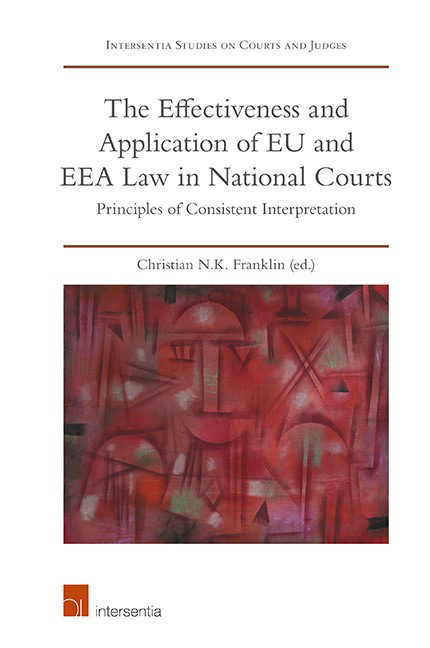 The Effectiveness and Application of EU and EEA Law in National Courts
The Effectiveness and Application of EU and EEA Law in National Courts Germany
Published online by Cambridge University Press: 31 January 2019
Summary
INTRODUCTION
European integration is developed and consolidated through law. Its implementation and effectiveness thereby essentially depend on the functionality of a multi-component system comprising European Union (EU) and national law. In this context, national courts are a keystone in the legal order of the EU due to their function of applying the law. This entanglement implies a decentralisation of the enforcement of law. Whilst from the perspective of EU law all national courts are equal in terms of their general duties, their jurisprudence is nevertheless entrenched in historically distinct legal structures, cultures and traditions.
Part of this entrenchment is how Member States model the role of national courts in general, and consequently their specific relationship to the effectiveness and application of EU law when applying the law. This contribution focuses on the domestic legal structure governing jurisprudence of German courts when the application of law is connected to the effectiveness of EU law. In this structure, consistent interpretation is one modus operandi serving effectiveness of EU law in the German legal system.
Although the understanding of the German framework to a great extent results from the jurisprudence of the Bundesverfassungsgericht (German Federal Constitutional Court – GFCC), a chronological case overview is not provided here. The description rests on the constitutional building blocks laid out in the GFCC ‘ s jurisprudence. In a first step, three broader issues are addressed to highlight the general framework of the relationship of international as well as EU law and national jurisprudence according to the legal system of Germany (section 2). Against this background, the contribution discusses how the effectiveness and application of EU law are generated by constitutional mechanisms on the one hand, and constrained by constitutional limits on the other (section 3).
BACKGROUND
The question of effectiveness and application of EU law in German courts is linked to the role of autonomous legal sources outside the national legal order, and the role of courts when referring to these. Three topics provide the necessary background for understanding the German approach: First, the general conceptual approach to the relationship between German and public international law; second, the specific conceptual approach to the relationship between German and EU law; and, finally, the structure of the German national court system.
- Type
- Chapter
- Information
- The Effectiveness and Application of EU and EEA Law in National CourtsPrinciples of Consistent Interpretation, pp. 101 - 148Publisher: IntersentiaPrint publication year: 2018


